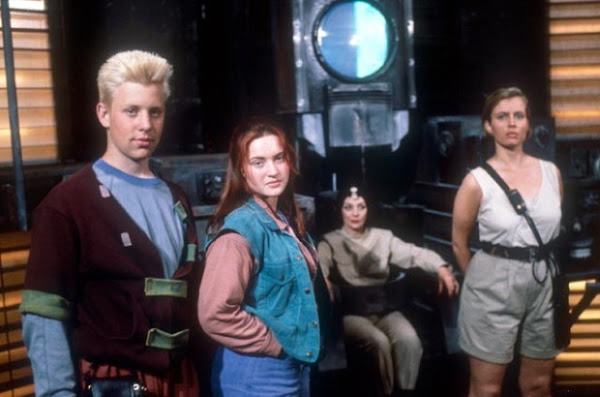As the 1990s dawned, a quiet revolution was stirring within the domain of children's television in Britain. The seed of this revolution was a six-episode science fiction series known as 'Dark Season'. Aired on BBC1 in 1991, Dark Season was the brainchild of Russell T Davies, a promising new talent who would later become synonymous with the reinvigoration of Doctor Who.
Dark Season was designed as a children's series but quickly transcended its targeted demographic to gain a wider audience, owing to its captivating storyline, vivid characters, and mature treatment of complex themes. Its premise was intriguingly simple: a group of school children become embroiled in a sinister plot involving their school's computer systems, forcing them to confront, outwit, and ultimately defeat an otherworldly threat.
At the heart of Dark Season was Marcie, played with youthful determination by Victoria Lambert. A curious and intelligent student, Marcie was an embodiment of the spirit of inquiry, drawing viewers into the narrative with her courage and wit. By her side was the brave yet hesitant Tom, played by Ben Chandler. Acting as the cautious counterpoint to Marcie's fearless curiosity, Tom was often hesitant about diving headfirst into danger, yet his loyalty and courage always came to the fore when his friends needed him, adding depth to his character. Rounding out the trio of protagonists was the loyal, sensible Reet, portrayed by a young Kate Winslet in one of her earliest roles.
Winslet embraced the character of Reet with a youthful energy that would later become a hallmark of her illustrious career. Renowned for her roles in films like 'Titanic' and 'The Reader', Winslet was only 16 when she appeared in 'Dark Season', yet even then, her talent was clear. As Reet, she embodied the quintessential supportive friend – loyal, sensible, and brave. Reet's character served as the grounding influence among the trio of friends at the heart of the series, her level-headedness often acting as the counterbalance to their more audacious plans. Winslet's naturalistic performance, combined with Davies' nuanced writing, made Reet a relatable character for many viewers. Over the years, as Winslet's career has blossomed, her portrayal of Reet in 'Dark Season' remains a testament to her early promise and enduring talent.
The antagonist of the series was the eerily compelling Mr. Eldritch, masterfully embodied by Grant Parsons. With his pale skin, bright hair, and stark suits, Eldritch was a striking figure, his cold charisma making him a captivating villain. The enigmatic Miss Maitland, portrayed by Brigit Forsyth, was another memorable character, her initially ambiguous loyalties adding an extra layer of suspense to the unfolding plot.
Russell T Davies was an instrumental force in shaping the series' distinctive identity. From conceptualising the premise to crafting the individual scripts, Davies demonstrated a level of creative ambition that was unusual for children's television at the time.
His contributions to 'Dark Season' were not limited to grand plotlines and thrilling science fiction concepts; Davies also displayed an innate understanding of character development and emotional storytelling. The core characters – Marcie, Thomas, and Reet – were carefully drawn, with each exhibiting a unique personality and development arc that was deftly woven into the overarching narrative.
Furthermore, Davies' incorporation of complex themes, such as the implications of unregulated technology and corporate manipulation, added a layer of depth to the series, making it accessible and engaging for both younger and older audiences. His ability to balance these various narrative elements positioned 'Dark Season' as a standout series and marked the beginning of Davies' influential career in television.
The series was divided into two three-part stories. The first, titled 'The Behemoth', dealt with Eldritch's plot to take control of the world by distributing free computers to schools, including Marcie's. The second story, 'The Sentinels', saw Marcie and her friends confront Miss Pendragon, who works for Eldritch and is attempting to revive the massive, secret Behemoth computer from its long-hidden location beneath the school. Both stories deftly balanced elements of mystery, horror, and science fiction, keeping viewers on the edge of their seats.
The series also benefited from the combined expertise of its production team. Led by director Colin Cant, known for his work on other popular children's series like 'Moondial', the team was able to bring Davies' vision to life with effective efficiency. Producer Richard Callanan, whose credits included 'Press Gang', was instrumental in assembling the talented cast and ensuring the smooth running of the production.
Dark Season also featured impressive special effects for its time. The glowing orbs in 'The Sentinels', for instance, were created using a mix of traditional puppetry and early CGI, providing a visual spectacle that enhanced the narrative.
Behind the scenes, the creation of Dark Season was a story of passion and perseverance. Davies, having recently transitioned from a career in graphic design to television writing, crafted the series as a love letter to the science fiction genre. According to BBC's script archives, Davies' scripts for the series were heavily detailed, filled with annotations and notes on character development, a testament to his dedication and the groundwork for his future successes.
Despite its limited run of just 6 episodes, Dark Season left an indelible mark on its viewers, many of whom remember it fondly even today. It showcased Davies' skill for combining grand, imaginative plotlines with grounded, relatable characters and settings. His treatment of mature themes, such as corporate greed and the potential dangers of unchecked technology, marked a departure from the more simplistic narratives often seen in children's programming at the time.
In the end, Dark Season stands as a testament to the creativity and ambition that characterised British children's television in the early 1990s. It paved the way for other innovative series and helped launch the careers of both its creator and its cast. More than thirty years later, its legacy continues to inspire new generations of viewers, proving that, in the realm of science fiction, the possibilities are truly endless.




























No comments:
Post a Comment